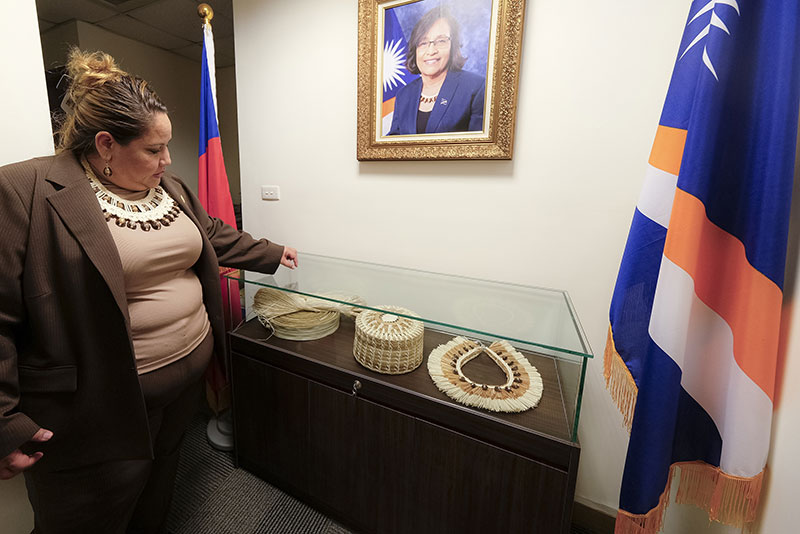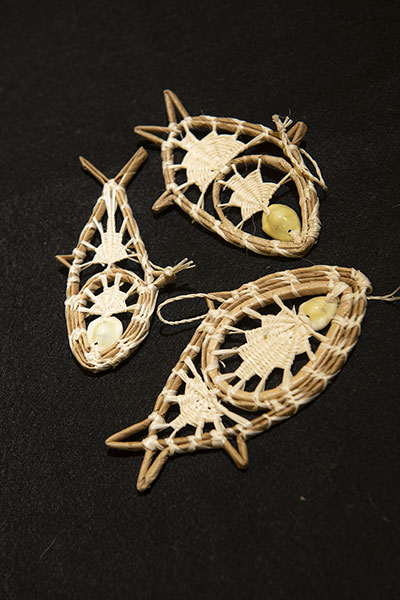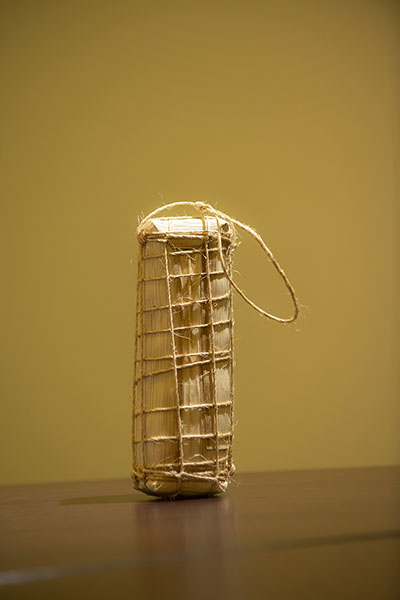
The Marshall Islands embassy in Taiwan has a display of representative Marshallese handicrafts. The photo on the wall shows the tenth RMI president, Hilda Heine.
Anjanette Kattil, ambassador of the Republic of the Marshall Islands to the Republic of China (Taiwan), is fond of the xiaolongbao soup dumplings served at the Din Tai Fung restaurant as well as Taiwan’s hotpot and boba tea. When she talks about the links between the Marshall Islands and Taiwan, she mentions not only Austronesian culture and shared concerns about climate change, but also seafood culture and stinky tofu.
Early in 2024, Ambassador Anjanette Kattil returned to the Republic of the Marshall Islands (RMI) to attend the inauguration of the country’s tenth president, Hilda Heine. After making the long journey back to Taiwan, she was interviewed by Taiwan Panorama.
Wearing a flower pinned above one ear and dressed in a coffee-colored pantsuit, Ambassador Kattil is also wearing a shell necklace that brings an ambience of the sea. She was previously deputy chief of mission at the RMI embassy in Taiwan from 2016 to 2019, and having again been posted to Taiwan in August 2023, this time as ambassador, she says in a calm and relaxed manner: “Taiwan hasn’t changed much—the people are still loving and hospitable. I’m glad to see the population is more diverse and that there is mutual understanding from people of different cultures. I also see the impact of climate change, with the winters being colder and the summers hotter.”

The RMI produces large quantities of coconuts, with coconut oil being processed into beauty products like soap and hair conditioner.
Natural-born mariners
The ocean is a highway that links Taiwan and the Marshall Islands.
The RMI, comprising 29 coral atolls and five small islands, is, like Taiwan, an island nation located in the Pacific Ocean. “We are a big ocean country,” says Kattil as she points to one of the famous Marshallese “stick charts.” These are navigational charts made using the midribs of coconut fronds tied together to form an open framework recording ocean currents and wind directions, with the locations of atolls or islands represented by shells tied to the framework.
“Each of the small islands of the Marshall Islands is like a garden. We built canoes and sailed the ocean between the islands, and we caught fish and cultivated the land, harvesting coconuts and breadfruit,” says Kattil. She says that Marshallese have an innate talent for finding their way at sea and are natural-born expert navigators. Seeing the sky filled with stars from birth, in the age before navigation technologies like the compass and GPS were invented, they could sail the open ocean by observing the constellations and judging the directions of the wind and sea currents.
In-depth experiences exploring Taiwan
The currents of the Pacific Ocean carry an abundance of marine life to Taiwan and the Marshall Islands, including billfish, tuna, and mahi-mahi, which are important economic assets. Living in Taiwan, Kattil can’t help but miss seafood specialties of her homeland such as fresh-caught yellowfin tuna, which is especially delicious when cooked in coconut milk or broiled outdoors. She also is nostalgic for the many dishes made with breadfruit. When the subject of Marshallese cuisine comes up, she can’t help but smile as she says: “I get hungry just talking about it.”
Fortunately, Taiwan has a lot of great food of its own. The ambassador speaks in Chinese to list her favorite Taiwanese delicacies, including the xiaolongbao at Din Tai Fung, shabu-shabu hotpot, and beef noodle soup. When she was posted back to the RMI in 2019, she would periodically feel nostalgic for Taiwan’s boba tea (pearl milk tea), especially that served with big tapioca balls.
And it is not only pearl milk tea that she loves: She shares that she also has a fondness for an occasional glass of Kavalan whiskey or Kinmen gaoliang (sorghum) liquor. Moreover, after taking office in 2023, she visited Gukeng Township in Yunlin County for the first time, at the invitation of county magistrate Chang Li-shan, to attend the Taiwan Coffee Festival, where she tried a chicken dish flavored with coffee as well as brews of various coffee varieties, and gained “a whole new level of respect” for Taiwanese coffee. She recalls that visiting the beautiful scenery of the coffee estates and drinking coffee with nutty flavor notes was “a highlight of my time here.”
In December 2023 she visited Alishan, where amid the splendid mountain scenery she drank tea prepared by a tea ceremony master. Closing her eyes, she recalls: “The ambience and the feeling really put my mind and body at ease. It was a very unique and special experience. I never knew that meditating while drinking tea can be a very healing process.”

Traditional weaving techniques are used to make refined craft products.
Shared concerns from culture to climate
In her free time, Kattil enjoys visiting indigenous communities all over Taiwan. “Not only does this help me to better understand Taiwan, I also do it because Taiwan’s indigenous peoples and the people of the Marshall Islands share Austronesian culture and heritage.” She points to the tattoos of the Paiwan people and the pronunciation of the Amis language as examples. The Amis words for eyes and ears, the terms of address for grandmothers and grandchildren, and the words for numbers are all very similar to these terms in Marshallese, the Micronesian language spoken by most of the Marshallese people. Even dance postures and the pronunciation of songs are similar. She finds these resemblances “profound and empowering.”
In 2018 Taiwan and the RMI signed the Agreement for Cooperation on Austronesian Peoples Cultural Affairs, making the Marshall Islands the first Austronesian country to sign such an agreement with Taiwan. The RMI is also one of the founding members of the Austronesian Forum, which has for many years now been promoting the revitalization of Austronesian languages and crafts and the preservation of traditional sports and skills.
As Taiwan and the Marshall Islands celebrated 25 years of formal diplomatic relations in 2023, they signed a Memorandum of Understanding Regarding the Adaptation and Contingency Fund for Climate Change. “In the past we always said that the RMI is on the front line of climate change, but now we should say that we are ‘at the front of the front line.’” Ambassador Kattil emphasizes that her country is very thankful to have a partner like Taiwan who will work together to take action to adapt to climate change and mitigate its impact.
Friendship from education to healthcare
The RMI frequently speaks up on Taiwan’s behalf in the international community, and Taiwan is the country’s second largest development partner, behind only the US. Interactions between Taiwan and the Marshall Islands are numerous and extensive.
In 2013 the RMI signed a cooperation agreement with Shuang Ho Hospital, operated by Taiwan’s Ministry of Health and Welfare. The program is now in its 11th year. The Marshalls’ first surgeon, David Alfred, returned home in 2023 after completing his training in Taiwan, and works for the RMI’s Ministry of Health and Human Services. Three Marshallese doctors are currently undergoing training at Shuang Ho, one in emergency medicine, one in urology, and one in internal medicine. “We are grateful to Shuang Ho Hospital and Taiwan for their help in enabling Marshallese to provide medical services for their compatriots.”
Ambassador Kattil is working hard to promote sister city relationships with various cities and counties in Taiwan, and to date eight jurisdictions have sister city relations with the RMI. There are also educational links. At present nearly 50 Marshallese are studying in Taiwan on scholarships, including 12 who arrived in 2024.

A paste made from pandanus fruit pulp, wrapped in pandanus leaves, can be preserved for long periods, making it useful for ocean voyages.
Links from travel to cuisine
In 2018, to celebrate the 20th anniversary of the establishment of formal diplomatic relations between the RMI and Taiwan, the two sides signed a reciprocal agreement on visa-free travel, under which citizens traveling between the two countries can stay up to 90 days without a visa. Taiwan’s foreign affairs minister, Jaushieh Joseph Wu, was the first person from Taiwan to enter the RMI visa-free under this agreement.
ROC citizens can use the opportunity of visa-free travel to explore the natural settings and culture of the various islands in the RMI and to enjoy the local cuisine and handicrafts.
Kattil advises that the Marshall Islands offer world-class diving, as well as excellent deep-sea fishing and spear fishing. Another can’t-miss is the Marshallese counterpart to Taiwan’s stinky tofu: rukwal (a.k.a. bwiro), a local dish made from fermented breadfruit.
Coconuts, from which large quantities of coconut pulp and coconut oil are produced, are an important economic resource for the Marshall Islands, and local people call the coconut palm the “tree of life.” Other major food sources include breadfruit trees and pandanus trees (thatch screwpine, Pandanus tectorius). Marshallese have traditionally used pandanus in many ways, making canoes from the tree trunks, weaving sails and skirts from the leaves, and even turning the pulp of the ripe fruit into a preserve that can be stored for 50 years. The ambassador has observed small pandanus trees along Taiwan Provincial Highway 8 (the Central Cross-Island Highway), which are in fact a species known as fragrant screwpine (Pandanus odorifer). The Amis indigenous people of Taiwan make pouches from its leaves that they fill with millet to make alivongvong. The two trees are utilized in different ways but with equal usefulness.
Besides visiting Majuro, the RMI capital, Kattil recommends visiting Arno Atoll. There are two hotels on Arno, but no mains electricity or Internet, and there one can enjoy not only the beautiful sky, sea, and white sand beach scenery, but also “authentic Marshallese living.” The lifestyle of rising with the sun to work and resting at sunset is still practiced by local residents. They live as they did a century ago, even cooking meals outdoors over open fires. Afterwards, you can visit nearby Milli Atoll, which was a battlefield in World War II and where you can dive among the remains of wrecked fighter planes and warships.
Travelers should also not fail to visit Bikini Atoll, listed by the United Nations Educational, Scientific, and Cultural Organization as a World Heritage Site for its history as a nuclear bomb test site in the 1940s and 1950s. Kattil notes that rising sea levels caused by climate change will sooner or later inundate the concrete dome on Enewetak Atoll (another major test site) that covers the crater in which waste materials from the bomb tests are buried. Infiltration of seawater may damage the structure and lead to the release of radiation. This is another reason why the RMI regards the issue of combating climate change with such urgency.
Ambassador Kattil believes that if her homeland and Taiwan continue to promote interactions and visits between governments, sister cities, and schools at all levels, “these two island countries can know and understand each other better, creating the basis for solid and enduring friendship.”
For more pictures, please click 《The Bonds Between Island Nations — An Interview with Marshall Islands Ambassador Anjanette Kattil》











